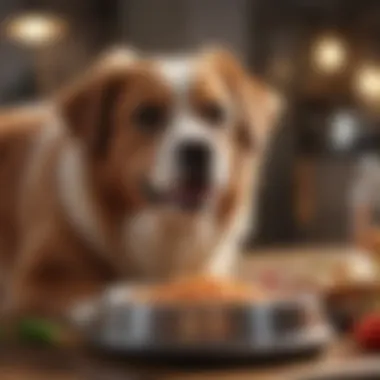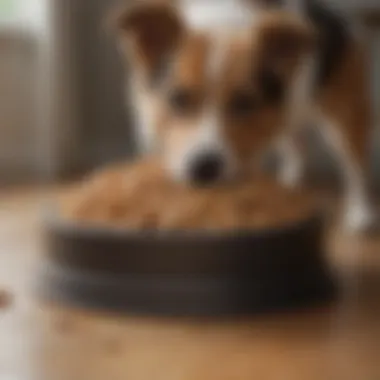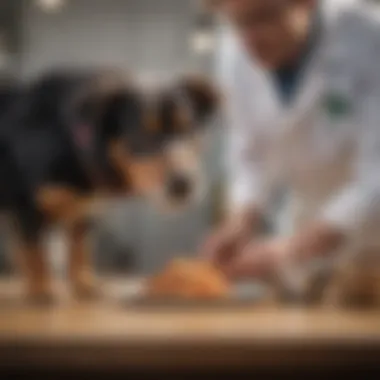Dietary Solutions for Dogs with Loose Stool Issues


Intro
Loose stool in dogs is a condition that can arise from various reasons, including dietary choices and health issues. Understanding what goes into your pet's diet during this time is crucial. The right food can help restore digestion and overall well-being. This article aims to delve into effective dietary strategies that pet owners can use to alleviate this common problem, helping dogs bounce back to health.
Understanding Your Pet
When addressing loose stool in dogs, it is essential to consider individual traits and needs. Each dog is unique, shaped by breed and temperament, which can affect their dietary preferences and tolerances.
Breed Traits
Certain breeds may be predisposed to digestive issues. For example, Dachshunds and Yorkshire Terriers often experience gastrointestinal sensitivity, which may lead to loose stools more frequently than larger breeds. Understanding these traits is the first step towards tailoring their diet effectively.
Common Temperaments
A dog's temperament can affect how they respond to dietary changes. Active dogs may require energy-dense foods during recovery from gastrointestinal distress. Conversely, calmer breeds might thrive on more soothing, fiber-rich options.
Special Needs
Some dogs have unique nutritional needs based on age, weight, or health conditions. Puppies, for instance, have different dietary requirements than senior dogs. If a dog has allergies or is recovering from surgery, specialized diets may be needed. It is best to consult with a veterinarian for personalized advice.
Pet Care Essentials
Effective management of loose stools also hinges on basic pet care principles. Paying attention to nutrition and overall wellness can dramatically improve a dog's digestive health.
Nutrition and Feeding Guidelines
Nutrition plays a vital role in controlling loose stools. Here are some guidelines:
- Introduce a bland diet: Foods like boiled chicken and white rice are often recommended.
- Incorporate fiber: Pumpkin and sweet potatoes can help firm up stool.
- Adjust meal frequency: Smaller, more frequent meals may aid in digestion.
Grooming Tips and Techniques
While not directly linked to diet, grooming is important for overall health. Regular brushing and bathing can minimize skin issues that sometimes accompany digestive problems. Cleanliness reduces the risk of infections.
Health and Wellness
Maintaining an overall healthy environment is key. Ensure your dog has access to clean water. Monitor their weight and check for signs of dehydration, which can occur with diarrhea. Frequent veterinary check-ups are vital for early detection of underlying issues.
Transitioning Back to Normal Diet
Once your dog has stabilized, reintroducing their normal diet should be done carefully. Gradually mix their standard food with the bland diet over several days. This process helps avoid sudden digestive upsets.
“It’s crucial to monitor your pet’s reactions during this transition period. Any signs of loose stools should be noted and addressed promptly.”
End
Understanding how to feed a dog with loose stools involves a thoughtful approach to nutrition and care. It encompasses recognizing individual needs, maintaining health, and transitioning back to their regular diet with care. Pet owners are urged to consult veterinary professionals at any sign of concern. Continual monitoring and informed decisions will foster a happier, healthier pet.
Understanding Loose Stools in Dogs
Loose stools in dogs can be a concerning issue for pet owners. Recognizing the nature of this problem is essential for determining the right approach to care and diet. Loose stools can indicate underlying health issues or dietary indiscretions. A clear understanding helps pet owners observe their dogs closely and take appropriate action.
Several factors contribute to loose stools, including dietary changes, infections, or stress. Identifying the cause behind the loose stool is critical as it lays the foundation for effective treatment. Moreover, monitoring these symptoms over time can aid in preventing more severe health concerns.
It is important to delve into the nuances of this condition. The more informed pet owners are, the better they can respond to their dog's needs. This entire article focuses on various aspects of feeding dogs with loose stools, including both immediate and long-term dietary strategies.
Causes of Loose Stools


The reasons behind loose stools are varied. Some dogs may simply be sensitive to certain foods or ingredients. Common causes include:
- Dietary Changes: Sudden changes in food can disrupt digestion.
- Food Intolerances: Specific ingredients may be hard for some dogs to digest.
- Infections: Bacterial or viral infections can lead to gastrointestinal upset.
- Parasites: Intestinal parasites often result in inconsistent stools.
- Stress: Changes in environment or routine can affect digestion.
Understanding these factors can tremendously help in addressing the loose stools effectively. Each cause may require a different management strategy.
Symptoms to Observe
Observing symptoms that accompany loose stools is vital for pet owners. Symptoms may range from mild to severe and can help guide action plans. Some common symptoms to watch for include:
- Frequent, urgent need to defecate.
- Presence of blood or mucus in stools.
- Vomiting or lethargy.
- Changes in appetite or energy levels.
- Signs of discomfort, such as whining or pacing.
Monitoring these symptoms can aid in determining whether a visit to the veterinarian is necessary. If symptoms persist or worsen, timely intervention is crucial to ensuring the health and comfort of the dog.
"Understanding the causes and symptoms of loose stools is the first step in managing your dog's gastrointestinal health effectively."
Loose stools may indicate a simple dietary issue or a more severe problem requiring veterinary evaluation. Pet owners should stay alert and be observant.
Initial Steps to Take
Taking the right initial steps when dealing with a dog suffering from loose stools is crucial for both diagnosis and treatment. These initial actions can not only alleviate discomfort for your pet but also lead to a more structured approach in restoring their gastrointestinal health. It's important to carefully evaluate the situation, understanding that loose stools can be symptomatic of various underlying conditions. Prompt and informed action may contribute to quicker recovery and a lower risk of further complications.
Evaluating the Severity
When you notice loose stools in your dog, the first task is to assess the severity. This involves observing how frequent the loose stools occur and any additional symptoms accompanying them. Ask yourself the following questions:
- How long has your dog been experiencing loose stools?
- Is there any blood in the stool?
- Has their behavior changed? For example, are they lethargic or showing signs of pain?
- Are they eating and drinking normally?
Different cases may call for different responses. For example, if your dog has only experienced mild loose stools for a day or two and shows no other concerning symptoms, a temporary diet change may suffice. However, if the loose stools are persistent, particularly severe, or accompanied by vomiting, it becomes essential to escalate your evaluation.
To keep track of your dog's progress, consider maintaining a log. Documenting the frequency and appearance of the stools can provide your veterinarian with valuable insights if a visit becomes necessary later on.
When to Consult a Veterinarian
Knowing when to consult a veterinarian is critical in managing your dog's health effectively. Here are several scenarios when a veterinary consult is warranted:
- Persistent Diarrhea: If loose stools last more than 48 hours without signs of improvement, it is time to seek professional advice.
- Accompanying Symptoms: Symptoms such as vomiting, dehydration, severe abdominal pain, or blood in the stool necessitate immediate veterinary attention.
- Unusual Behavior: If your dog exhibits unusual behavior, such as extreme lethargy or disinterest in food and water, you should not wait long before reaching out to a vet.
- Medical History Considerations: If your dog has pre-existing health conditions or is on any medications, it’s wise to consult your vet sooner.
In some situations, the veterinarian may recommend diagnostic tests, including fecal exams or blood tests, to determine the cause of the loose stools. Early intervention can prevent more serious health concerns from developing.
Always prioritize the well-being of your dog. When in doubt about your pet’s health, consulting a veterinarian is the safest course of action.
Dietary Recommendations for Dogs with Loose Stools
Dietary recommendations play a crucial role in managing dogs with loose stools. A balanced diet not only aids in recovery but also ensures the dog's overall wellbeing. The types of food provided can significantly influence gastrointestinal health. In this section, we explore two categories: bland diet essentials and commercial diet options. Each category contains specific food items that help soothe the digestive system and can lead to improved stool consistency.
Bland Diet Essentials
Boiled Chicken and Rice
Boiled chicken and rice are classics when it comes to a bland diet for dogs with loose stools. This combination is easy to digest, making it gentle on a sensitive stomach. Chicken serves as a high-protein source while rice provides carbohydrates.
This dish is often recommended because it is not only soothing but also works as a good base for gradual reintroduction of other foods. Its unique feature is the low-fat content, which helps ease the digestive process without adding stress on the gut. However, it is essential to ensure that the chicken is plain, without any seasoning.
Pumpkin and Plain Yogurt
Pumpkin is rich in fiber, which can help firm up loose stools. Plain yogurt, on the other hand, contains probiotics that support gut health. This combination works well because it can stabilize digestive functions.


Pumpkin is often praised for its ability to regulate bowel movements, and plain yogurt adds nutritional value without excess sugar or additives. The main advantage of this mix is its dual impact on digestion. However, some dogs may be lactose intolerant, which is a consideration when serving yogurt.
Sweet Potatoes
Sweet potatoes are another beneficial option when addressing the issue of loose stools in dogs. Rich in vitamins and soluble fiber, they provide not just carbohydrates but also nutrients that support overall health. The fiber in sweet potatoes can contribute to better stool consistency.
A key characteristic of sweet potatoes is their digestibility, making them suitable for dogs facing gastrointestinal distress. They can be mashed or cut into small pieces and served warm. While they are generally well-tolerated, moderation is essential as too much fiber can lead to gas or other digestive upset.
Commercial Diet Options
Veterinary Formulated Diets
Veterinary formulated diets are specifically designed for dogs with digestive problems. Formulated by experts, these diets often include high-quality ingredients that are easy on the stomach. They typically come in both dry and wet forms, offering versatility.
The unique aspect of these diets is that they are tailored to address specific health issues, including sensitive stomachs. A major advantage is that they often incorporate additional nutrients and probiotics to aid in recovery. However, they can be more expensive than regular dog food, making it important to evaluate their necessity based on the dog's condition.
Grain-Free Options
Some dogs may benefit from grain-free diet options. These foods focus on high-quality proteins and can sometimes help alleviate gastrointestinal issues for certain breeds. They can be especially helpful for dogs that are allergic to grains or have sensitivity to gluten.
A key feature of grain-free formulas is that they often include alternative carbohydrates like peas or potatoes. This characteristic makes them appealing for pet owners who want to avoid grains. However, it is essential to thoroughly assess the overall nutritional profile; some grain-free options may lack other vital ingredients necessary for a well-rounded diet.
Probiotics and Digestive Aids
Probiotics and digestive aids can also play an important role in managing loose stools. These supplements promote healthy gut bacteria, which can restore balance in the digestive system. They are available in various forms, including powders and treats.
These aids are beneficial as they focus on long-term digestive health. Many dog owners find that adding probiotics to their dog's diet not only helps in the current situation but also prevents future incidents of digestive trouble. However, it's crucial to select reputable brands to ensure product efficacy.
It's advisable to seek veterinary guidance before making significant changes to a dog's diet, particularly in cases of ongoing gastrointestinal issues.
Gradual Transitioning to Normal Diet
Transitioning a dog back to its normal diet after experiencing loose stools is a critical step. A gradual shift minimizes the risk of aggravating the digestive system, which may still be sensitive. It is vital to be cautious in this process as a sudden change in diet can lead to further gastrointestinal upset, setting back any progress made in resolving the issue. Pet owners must be mindful of the potential repercussions of rushing this transition and aim to restore the dog’s health in the most considerate manner possible.
Timing the Transition
The timing for transitioning back to a normal diet varies depending on the dog’s recovery. Generally, once the loose stools have resolved for 2 to 3 consecutive days, it is a good indicator that the dog’s digestive system is beginning to stabilize. At this point, owners can start reintroducing regular food. It is suggested to do this over the course of a week. Begin with just a small amount of the regular food mixed with the bland diet, gradually increasing the normal food portion each day. Here is a simple schedule:
- Day 1-2: 25% normal food, 75% bland diet
- Day 3-4: 50% normal food, 50% bland diet
- Day 5-6: 75% normal food, 25% bland diet
- Day 7: 100% normal food
This timing strategy allows the dog's digestive system to adjust without resulting in further loose stools.
Monitoring for Adverse Reactions
As a dog transitions back to its usual diet, careful monitoring for any adverse reactions is crucial. It is normal for some dogs to experience minor adjustments, but pet owners should be alert to signs of distress. Symptoms such as vomiting, renewed loose stools, or lethargy require immediate attention. Keeping a diary of the dog’s reactions can be beneficial. Record what food is given, the amount, and any changes in behavior or stool consistency.
A gradual method is vital for ensuring that transitioning back to a normal diet does not cause additional digestive disturbances.
If any adverse reactions occur, it may be necessary to pause the transition and revert back to the bland diet until the dog stabilizes again. Communication with a veterinarian throughout this process is always advisable, providing peace of mind and professional guidance.
Hydration Considerations
Maintaining proper hydration is essential when addressing loose stools in dogs. Loose stools can often lead to dehydration, which can be harmful and complicate the dog's recovery. Therefore, ensuring adequate water intake and considering electrolyte solutions is critical to support gastrointestinal health.
Importance of Water Intake
Water plays a vital role in a dog's overall health. It aids digestion, regulates body temperature, and allows for nutrient absorption. When a dog experiences loose stools, they lose more fluids and electrolytes than usual. This increases the requirement for water intake.


It is important that pet owners encourage their dogs to drink. Fresh and clean water should always be available. Dogs may not drink enough on their own, especially when feeling unwell, so some strategies can help:
- Offer small amounts frequently: Instead of a large bowl of water, present smaller amounts often to entice drinking.
- Ensure palatability: Sometimes adding a bit of low-sodium chicken broth or using a pet water fountain can make water more appealing.
- Monitor intake: Keep track of how much water your dog is drinking. If they are reluctant, consult a veterinarian for advice.
Hydrated dogs are less likely to experience severe effects from diarrhea and can recover more quickly.
Electrolyte Solutions
In cases of dehydration caused by loose stools, electrolyte solutions can offer beneficial support. These solutions help replenish lost minerals and fluids, aiding recovery. They are designed specifically for pets, with suitable formulations that keep the balance of electrolytes.
When considering electrolyte solutions, pet owners should note the following points:
- Commercial options: Look for veterinary-recommended products specifically formulated for dogs. These can be found at pet stores or through a veterinarian's office.
- Homemade solutions: Some may opt to prepare homemade electrolyte solutions. Mix water with a small amount of salt and sugar but consult a vet beforehand to ensure it’s safe and effective for your dog.
- Follow veterinary advice: It is crucial to consult with a veterinarian before introducing electrolyte solutions into your dog’s diet. The veterinarian can guide which solution best fits your dog's specific needs.
Remember, addressing hydration is as vital as dietary changes when dealing with loose stools. Proper hydration supports overall health, which is a critical aspect of recovery for dogs.
Monitoring Overall Health
Monitoring overall health is crucial for dogs, especially those experiencing loose stools. Loose stools can indicate various underlying issues, from diet to serious medical conditions. Hence, keeping a close eye on your dog's health can help, early detection of any concerns is key in ensuring a swift recovery.
Regular Checkups
Regular checkups with a veterinarian provide invaluable insight into your dog's health. During these visits, the vet assesses the dog’s weight, coat condition, and overall demeanor. It is wise to schedule checkups at least once a year for healthy dogs. However, for dogs experiencing loose stools, more frequent visits may be necessary.
At the vet, you can discuss your dog's recent dietary habits, changes in stool consistency, and other symptoms that may be troubling. The vet will likely recommend blood tests or fecal exams to rule out parasites and infections. This preventive approach often enhances the chances of identifying issues before they escalate.
- Importance of regular checkups:
- Early detection of potential health issues
- Monitoring of ongoing health problems
- Tailored dietary advice from professionals
Tracking Changes in Behavior
Tracking any changes in behavior can provide essential clues to your dog’s overall health. Changes might include increased lethargy, restlessness, changes in appetite, or unusual vocalizations. Such signs may indicate discomfort or pain, warranting immediate attention.
It is helpful to maintain a log of your dog's behavior, especially when they show symptoms like loose stools. Record any patterns or notable changes over time. For example, if the frequency or consistency of stools fluctuates or if your pet’s energy levels drop, make note of it.
- Key behavioral signs to monitor:
- Decreased activity levels
- Changes in eating habits
- Signs of distress or discomfort
Noting these alterations can prove beneficial during vet visits, providing your veterinary professional with a clearer picture of your dog’s condition. Changes in behavior can reflect not only digestive issues but also emotional well-being, making comprehensive monitoring essential.
Overall health monitoring plays a critical role in maintaining your dog's well-being. Stay proactive, as it aids in timely interventions and effective management of health concerns.
Preventive Measures for Future Incidents
Preventive measures are essential to reduce the likelihood of future incidents of loose stools in dogs. Understanding the underlying factors that can lead to gastrointestinal upset is vital for any dog owner. By adopting careful dietary management and routine health monitoring, pet owners can create a stable environment for their dogs. This not only improves the dog’s overall health but also minimizes stress for the owner.
Dietary Management
One of the primary pillars of preventing loose stools in dogs is proper dietary management. A balanced diet enhances digestion and ensures that dogs receive all the nutrients they need. Here are key points to consider:
- Quality of Food: Choose high-quality dog food free from artificial additives or fillers. Digestive issues often arise from lower-quality ingredients.
- Regular Feeding Schedule: Maintain a consistent feeding schedule. This creates a routine that aids digestion.
- Introduce New Foods Slowly: When introducing new food, do so gradually over a week. This allows the digestive system to adjust, reducing the risk of upset stomachs.
- Incorporate Fiber: Fiber plays a crucial role in digestion. Adding safe fiber sources such as pumpkin or sweet potatoes can help regulate stool.
- Avoid Table Scraps: Full of seasonings and other ingredients that may upset dog's stomach, table scraps should be avoided. Stick to dog-friendly snacks and treats only.
Integrating these tips into daily feeding practices creates a robust foundation for your dog’s gastrointestinal health.
Routine Health Monitoring
Routine health monitoring involves keeping track of your dog's overall well-being. This vigilance can significantly reduce the occurrence of gastrointestinal issues. Here are some aspects to prioritize:
- Regular Vet Check-ups: Schedule vet check-ups at least once a year. Professional evaluations can catch potential health issues early.
- Monitor Weight: Watch your dog’s weight closely. Sudden changes may indicate health problems, including digestive issues.
- Behavioral Observations: Has your dog become less active? Noticed changes in eating or drinking habits? Such changes may signal underlying problems.
- Stool Checks: Regularly check your dog's stool for abnormalities. This can help identify issues like parasites or dietary intolerances more quickly.
Maintaining vigilance in health monitoring ensures timely intervention and supports your dog’s health.
In sum, preventive measures through dietary management and health monitoring play a pivotal role in avoiding future incidents of loose stools. These practices not only benefit your dog's digestion but also enhance the overall quality of life.



